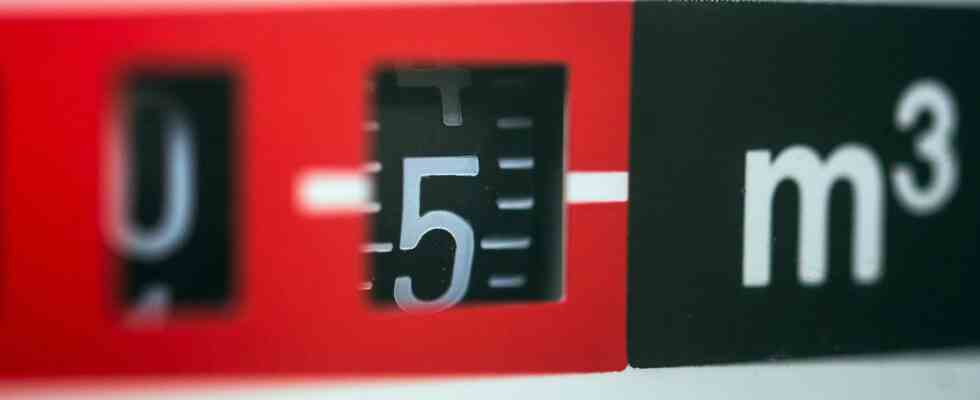Status: 01/27/2023 2:44 p.m
Wholesale prices for natural gas have been falling for weeks, and the situation on the energy market has unexpectedly eased significantly. The calls are getting louder that the utilities will soon be making their customers’ tariffs cheaper.
In view of the significant drop in wholesale prices for natural gas, there are increasing calls for this relief to be passed on to energy customers. “If we get through the winter with sufficiently full gas storage tanks, then the signals are pointing to price reductions,” said Udo Sieverding, the energy expert at the North Rhine-Westphalia consumer advice center.
He expects that after the spring there will be a big wave of price reductions, in which the energy suppliers will at least have to reduce the peak prices of more than 15 cents per kilowatt hour for natural gas. “Then you have to see price cuts.”
Futures contract at less than 60 euros
Energy suppliers justified their price increases during the Ukraine war with “increased procurement costs”. Since the procurement costs are now noticeably falling, consumers should actually benefit from this. Gas prices on the energy markets have fallen sharply in recent weeks. For example, the European gas future TTF is currently trading at less than 60 euros per megawatt hour. One megawatt hour currently costs less than it did in autumn 2021, i.e. before the start of the Ukraine war, write the Commerzbank commodities experts.
Last summer, the high was 345 euros. According to the Federal Association of Energy and Water Industries (BDEW), wholesale prices in 2022 on the futures market, where gas suppliers procure most of the gas they will need in the future, averaged EUR 117 per megawatt hour.
Gas is still relatively expensive
However, the current wholesale price is still well above the historical quotations before the crisis years: “The average wholesale gas price for the years 2015 to 2019 was around 18.50 euros per megawatt hour,” according to the BDEW.
According to BDEW, the average natural gas price for households in apartment buildings was 19.8 cents per kilowatt hour in the fourth quarter of 2022, and 20.0 cents for single-family houses. For comparison: According to the Federal Statistical Office, private households in Germany paid an average of 6.83 cents per kilowatt hour for natural gas in the second half of 2021. The comparison portal Verivox reports that a kilowatt hour of gas now costs an average of 11.8 cents for new customers.
Utilities dampen expectations
According to the energy suppliers and municipal utilities, however, it is still too early to seriously consider price reductions. He warns against false hopes, said Ingbert Liebing, general manager of the Association of Municipal Enterprises (VKU), the “Neue Osnabrücker Zeitung”. “According to our assessment, it is foreseeable that gas and electricity tariffs will double.” The crisis is no longer quite as dramatic, but not over. Liebing did not name a period for the expected price doubling.
Liebing rejected the accusation by consumer advocates that municipal utilities demanded “moon prices”. “The current spot market and futures prices are not yet so cheap that they are already having a sustained price-lowering effect. They would have to fall further and, above all, permanently,” he said.
The BDEW described the current fall in gas wholesale prices as a good sign, but they are not yet a reason to sound the all-clear. According to the consumer portal Check24, the relaxation on the gas market will only reach consumers with a delay.
Long-term procurement strategies
According to the BDEW, most energy suppliers are pursuing long-term procurement strategies. Therefore, market prices could not have a one-to-one and direct impact on retail prices. A large part of the energy that was delivered to end customers last year was bought at lower prices before the crisis. The purchase price, which has now fallen temporarily, will only affect end customer prices later, said Kerstin Andreae, Chair of the BDEW Executive Board.
The suppliers’ strategy smooths out the developments on the energy exchanges and protects customers from sharp price jumps. “But this also means that the temporarily lower purchase price will only affect end customer prices later.”
Consumer advocates recommend comparing prices
Consumer advocates like Sieverding are therefore advising household customers to whom increases are still being announced in these weeks to consider changing tariffs or providers. He refers to the comparison portals, in which prices can now be found again that are below the temporarily cheaper basic service tariffs. “Looking into the portals can be worthwhile,” he says.
However, it can be observed that many customers initially wanted to stay with their municipal utilities or other basic suppliers who had accepted them at the time after sudden terminations by energy discounters. This is “very understandable”, especially since the gas price brake this year caps 80 percent of previous consumption to 12 cents.

